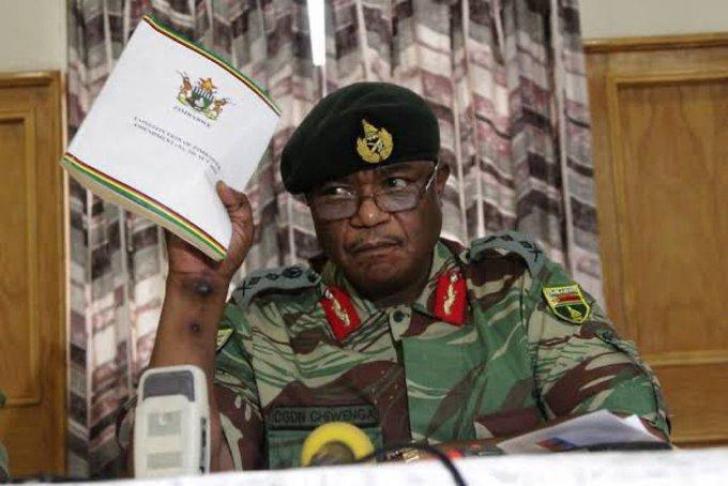News / National
'Mnangagwa 2017 coup was to avoid prosecution for Gukurahundi massacres'
22 Oct 2024 at 07:07hrs |
0 Views

A former deputy director general in Zimbabwe's Central Intelligence Organisation (CIO), Lovemore Mukandi, has made explosive allegations regarding the 2017 coup that brought President Emmerson Mnangagwa to power. Mukandi claims that Mnangagwa, his deputy Constantino Chiwenga, and the late Fifth Brigade commander Perrence Shiri orchestrated the coup to escape potential prosecution for their involvement in the Gukurahundi genocide.
In an online interview promoting his recently released book, How Mnangagwa Blindsided Robert Mugabe and Grabbed Zimbabwe, Mukandi contends that the coup was premeditated, stemming from fears of accountability for past atrocities committed in the 1980s. During this dark chapter in Zimbabwe's history, approximately 20,000 mainly Ndebele-speaking individuals were killed by the Fifth Brigade, a military unit trained by North Korea, as Mugabe sought to suppress dissent against his regime.
Mukandi stated, "This was long planned in the 1980s because Mnangagwa wanted to rule but realized he would not win elections. The timing relates to the atrocities committed in Matabeleland." He elaborated that Shiri, Chiwenga, and senior CIO officials Edson Shirihuru and Menard Muzariri were all complicit in the Gukurahundi operations, which were coordinated by Mnangagwa.
"There was a fear among them that one day they might have to account for these atrocities," Mukandi claimed, emphasizing the anxiety within the group regarding potential prosecution if power were transferred to an individual they did not trust.
The former CIO official asserted that Mugabe had intended for Sydney Sekeramayi to be his successor, a prospect that alarmed Mnangagwa and his associates. Mukandi believes this knowledge motivated Mnangagwa to act decisively in the coup to prevent an unwanted successor from assuming power.
"I know for a fact from my interaction with Mugabe when I was deputy director general that he preferred Sekeramayi to be his successor," Mukandi stated. "These people involved in atrocities in Matabeleland feared that if power was handed over to someone they did not trust, they could face serious consequences."
The November 2017 coup is portrayed by Mukandi as a preemptive strike against the transfer of power to a successor who might hold them accountable for their actions during the Gukurahundi period.
Mukandi, who fled to Canada in the early 2000s after being dismissed from the CIO due to alleged fraud, was deported back to Zimbabwe in 2011. His dismissal was followed by the appointment of Happyton Bonyongwe, who recently released his memoirs titled One among Many: My Contribution to the Zimbabwe Story, at an event attended by Mnangagwa and senior military officials.
Shiri, who died in July 2020, was known for his notorious role during the Gukurahundi and was infamously referred to as "Black Jesus" for the power he wielded over life and death during that era. Mukandi's revelations bring renewed scrutiny to the events surrounding both the Gukurahundi atrocities and the coup that reshaped Zimbabwe's political landscape.
In an online interview promoting his recently released book, How Mnangagwa Blindsided Robert Mugabe and Grabbed Zimbabwe, Mukandi contends that the coup was premeditated, stemming from fears of accountability for past atrocities committed in the 1980s. During this dark chapter in Zimbabwe's history, approximately 20,000 mainly Ndebele-speaking individuals were killed by the Fifth Brigade, a military unit trained by North Korea, as Mugabe sought to suppress dissent against his regime.
Mukandi stated, "This was long planned in the 1980s because Mnangagwa wanted to rule but realized he would not win elections. The timing relates to the atrocities committed in Matabeleland." He elaborated that Shiri, Chiwenga, and senior CIO officials Edson Shirihuru and Menard Muzariri were all complicit in the Gukurahundi operations, which were coordinated by Mnangagwa.
"There was a fear among them that one day they might have to account for these atrocities," Mukandi claimed, emphasizing the anxiety within the group regarding potential prosecution if power were transferred to an individual they did not trust.
"I know for a fact from my interaction with Mugabe when I was deputy director general that he preferred Sekeramayi to be his successor," Mukandi stated. "These people involved in atrocities in Matabeleland feared that if power was handed over to someone they did not trust, they could face serious consequences."
The November 2017 coup is portrayed by Mukandi as a preemptive strike against the transfer of power to a successor who might hold them accountable for their actions during the Gukurahundi period.
Mukandi, who fled to Canada in the early 2000s after being dismissed from the CIO due to alleged fraud, was deported back to Zimbabwe in 2011. His dismissal was followed by the appointment of Happyton Bonyongwe, who recently released his memoirs titled One among Many: My Contribution to the Zimbabwe Story, at an event attended by Mnangagwa and senior military officials.
Shiri, who died in July 2020, was known for his notorious role during the Gukurahundi and was infamously referred to as "Black Jesus" for the power he wielded over life and death during that era. Mukandi's revelations bring renewed scrutiny to the events surrounding both the Gukurahundi atrocities and the coup that reshaped Zimbabwe's political landscape.
Source - NewZimbabwe
Join the discussion
Loading comments…






























